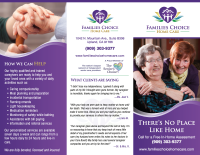
The USC School of Gerontology recently published a post stating that nearly 90% of adults 65 years and older want to age in place, in their own homes, rather than transition into assisted living or nursing home facilities. This is excellent news for their caregivers and families since in-home care is more affordable than a facility or community-based care.
However, the quality of in-home care depends on a few key factors:
- The experience level and professionalism of the caregivers.
- A proactive care plan that provides increased levels of care before an accident or injury leads to a crisis.
- Knowing when to increase care shifts from part-time to full-time or overnight care.
When these factors are accounted for, loved ones have access to the type(s) of care they need, when they need it—no matter what time of the day or night.
Finding the Best In-Home Care Agency
Choosing the best 24-hour care services for the elderly in their own home takes a bit of time and research. Take advantage of licensed care agencies’ free, in-home assessments. We promise you’ll know which one feels like the best fit by the time you’ve finished interviewing three to five agencies.
All prospective agencies should be:
- Currently licensed, bonded, and insured
- Proud of the continuing education/training provided to their caregivers
- Experienced at providing overnight services
- Able to provide a team of caregivers (typically four or five) that rotate shifts, rather than one or two caregivers who couldn’t possibly keep up with long-term care demands
Once you’ve found the right agency, the benefits of in-home care are invaluable. First, you’ll have peace of mind knowing your loved one is safe in the comfort of their own home. You’ll also notice how their quality of life improves from regular companionship, better access to healthy meals, and the ability to remain connected to their community and social network.
Signs a Loved One Needs 24-Hour Care
In-home care often begins on a more infrequent or part-time basis. Most of our first contracts are created to provide respite care for spouse and family caregivers or for part-time services that support clients in their daily routines and outings.
Over time as mobility issues, physical challenges, or cognitive decline increase, we often shift to 24-hour care for the elderly in their home.
In the ideal long-term care plan, care services are increased just ahead of a client’s needs, preventing any serious accidents or crises. However, certain signs indicate it’s time to move from part-time to full-time services, which can include overnight or live-in services.
The following are signs your spouse, parent, or grandparent needs 24-hour care.
1. They’re diagnosed with Alzheimer’s or dementia (or showing signs of progressive age-related memory loss)
Alzheimer’s and other forms of dementia are progressive. While spouse or family caregivers can provide care and safety during the early stages of the disease, 24-hour care is essential by the time a person’s memory loss becomes acute.
Without professional 24-hour care for the elderly in their home, loved ones aren’t safe. Those with mid-stage dementia are prone to:
- Getting lost
- Forgetting to turn off stove-top burners and other heated appliances
- Nighttime wandering
- Leaving the house doors and windows open or unlocked
- Sundowning (irritability during twilight/evening hours)
- Struggling to recognize friends and extended family members, resulting in panic or angry/violent outbursts
- Losing track of days, dates, time
- Forgetting to take (or overtaking) medications
Primary caregivers need (and deserve) a break, which is why we recommend full-time caregiving at this stage. If your loved one lives alone, a scaled caregiving plan must be in place from the very beginning.
If you live with your loved one, you may only need overnight caregiving services with occasional shifts for respite care or that allow you to enjoy regular evening or weekend activities.
2. They’re prone to tripping or falling (or recently had a fall-related injury)
According to the CDC, one in every five seniors’ falls results in a serious injury such as broken bones or blows to the head. Creating a safe and accessible home is a primary step for seniors planning to age in place.
If you notice your loved one experiencing mobility, balance, or gait issues, it’s time to consider in-home care support to keep their transitions and transfers as safe as possible.
3. Making meals is a hardship
Seniors have an increased risk of malnutrition, often due to not having access to fresh, healthy food products and/or the inability to prepare their meals. If your aging loved one lives alone and is no longer interested in cooking or preparing meals, let a licensed caregiver agency provide support.
One of the many benefits of in-home care is access to regular meals and caregivers keeping an eye on the client from shift to shift. We report to the family if there are signs that full-time or overnight care is needed.
4. They’ve been seriously ill or recently released from a hospital/acute care rehab center
In-home caregiving services are essential if a loved one is seriously ill, recovering from an illness, or planning their release from a hospital or acute care center. Caregivers relieve the burden of daily tasks and chores, also assisting clients with any personal needs—including toileting/incontinence care—until they’ve regained their strength.
This minimizes the risk of falls, relapses, and hospital readmissions.
5. A decline in personal hygiene
A decline in personal hygiene indicates help is needed for an elderly loved one to remain in their home. 24-hour caregiving includes support with personal care and hygiene tasks (showering/bathing, toileting, grooming, etc.), as well as light housekeeping, laundry, and linen changes.
How to Get 24-Hour Care for the Elderly at Home
Scheduling an assessment with a qualified Inland Empire home care agency is the best way to get 24-hour care for an elderly loved one. Families Choice Home Care has cared for our clients at home for almost a decade.
We’re happy to provide recent and current referrals so you can hear firsthand how our services improved the lives of our clients and their families. Schedule your free assessment and learn more about how we can help.





